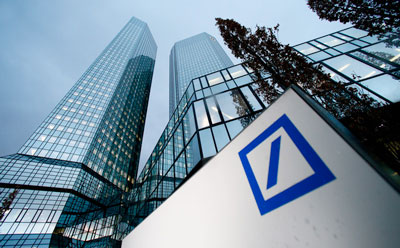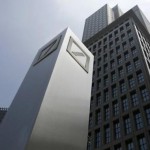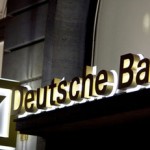Deutsche Bank AG said it won’t pay the $14 billion sought by the U.S.

-
Negotiations are ‘just beginning,’ lender says in statement
-
U.S. shares of biggest German bank tumble in extended trading
Deutsche Bank AG said it won’t pay the $14 billion sought by the U.S. Justice Department to settle an investigation into the firm’s sale of residential mortgage-backed securities, a figure that’s more than triple what some analysts estimated could be a potential worst-case.
“Deutsche Bank has no intent to settle these potential civil claims anywhere near the number cited,” the company said in a statement early Friday in Frankfurt. “The negotiations are only just beginning. The bank expects that they will lead to an outcome similar to those of peer banks which have settled at materially lower amounts.”
Germany’s largest lender confirmed that it had started negotiations with the Justice Department to settle civil claims the U.S. may consider over the bank’s issuing and underwriting of residential mortgage-backed securities from 2005 to 2007. The $14 billion is considered an “opening bid” that could go “much lower,” according to the Wall Street Journal, which reported the figure shortly before Deutsche Bank issued its statement.
U.S. shares of Deutsche Bank tumbled 6.5 percent to $13.80 in extended trading at 7:03 p.m. in New York. The company’s stock has plunged 42 percent this year in Germany through the close of trading Thursday.
Justice Department spokesman Peter Carr declined to comment on the negotiations.
Litigation Reserves
JPMorgan Chase & Co. analysts wrote in a note to clients earlier Thursday that a settlement of about $2.4 billion “would be taken very positively,” and that an agreement exceeding $4 billion would pose questions about the bank’s capital positions and force it to “build additional litigation reserves.”
Deutsche Bank Chief Executive Officer John Cryan, 55, has struggled to boost profits as unresolved legal probes and claims compound concerns that the lender will be forced to raise capital or sell assets. Reaching a mortgage deal would clear a major hurdle for the bank, which has paid more than $9 billion in fines and settlements since the start of 2008.
“In defense of protecting its shareholders’ money, Cryan is well within his rights in negotiating a more equitable and just settlement with the U.S. government, and calling this one a punishment that’s several orders of magnitude greater than the crime,” said Tony Plath, a finance professor at the University of North Carolina. Plath expects a final settlement of about $4 billion to $5 billion.
Settlement Goal
Cryan has said that he aims to settle major outstanding legal issues swiftly. Deutsche Bank had 5.5 billion euros ($6.2 billion) set aside for settlements and fines at the end of June, with Chief Financial Officer Marcus Schenck saying in July that the lender will probably face “material” litigation charges in the second half.
In addition to the U.S. mortgage investigation, Deutsche Bank faces litigation and regulatory probes relating to issues such as foreign-currency rate manipulation and precious metals trading. The German bank is a party to 47 civil actions concerning the setting of interbank lending benchmarks, according to its 2015 annual report published in March.
The Justice Department, in concluding previous investigations into the sale of mortgage-backed securities that soured during the financial crisis, typically has presented initial penalties higher than what banks ultimately paid, people familiar with those negotiations have said. The sides may negotiate over the final tab, as well as what conduct the bank will acknowledge and whether individuals will be sanctioned.
Bank of America Corp. paid $17 billion to reach a settlement in a similar case in 2014, the biggest such accord to date. Goldman Sachs Group Inc. agreed to a $5.1 billion settlement with the U.S. earlier this year, including a $2.4 billion civil penalty and $875 million in cash payments, to resolve U.S. allegations that it failed to properly vet mortgage-backed securities before selling them to investors as high-quality debt. The settlement included an admission of wrongdoing.
Source: Bloomberg





























